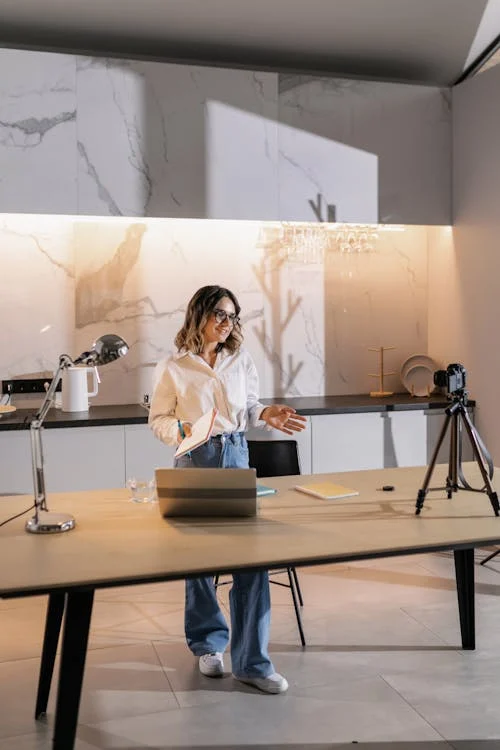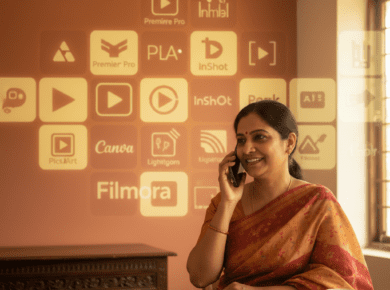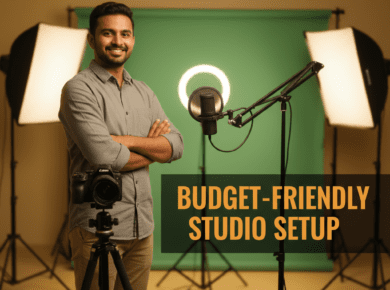In today’s digital age, where online courses and digital education are booming, camera confidence is a must have skill for course creators looking to establish themselves in the world of online education. But to truly connect with students and make learning enjoyable, course creators need to master the art of camera presence – it’s about more than just being visible; it’s about being engaging, authentic, and confident. But how does one build camera confidence as an online teacher?
Whether recording lessons or conducting live sessions, your presence on camera directly impacts student engagement and learning outcomes. However, feeling natural in front of the lens doesn’t come easily to everyone. Many course creators struggle with camera shyness, distracting body language, or technical hiccups, which can hinder their delivery. But with the right strategies and practice, anyone can overcome these challenges.
Building confidence requires practice, preparation, and a shift in mindset. The key is to feel comfortable with yourself and your content, so your passion and expertise shine through on-screen. With the right techniques and consistent effort, anyone can overcome on-camera anxiety and connect effectively with their audience. In this blog, we will know practical steps to enhance your camera presence, ensuring you deliver content confidently and create a meaningful learning experience for your students.
Do you want to take your online course business online? Inquire by providing your contact number below and experts at Classplus will contact you to kickstart your business online!
7 Effective Techniques to Build Camera Confidence as an Online Educator
Building camera confidence does not happen overnight, but with consistent practice and the right techniques, you can enhance your on-camera presence. Here are seven effective ways to boost your confidence as an online course creator –
#1 Prepare & Practice Regularly
Plan your content ahead and rehearse before recording. For instance, practice teaching in front of a mirror or record trial sessions. This familiarity builds fluency, helping you avoid unnecessary pauses or anxiety. Regular practice ensures you are well-prepared for live or recorded classes.
#2 Create a Professional Setup
A clean background, good lighting, and proper audio ensure a polished look. For example, using a ring light can improve your appearance and boost confidence. When you feel comfortable with your environment, it becomes easier to focus on teaching.

#3 Master Technical Skills
Get familiar with the tools and software used for recording. Knowing how to handle technical glitches, such as camera or microphone issues, helps maintain composure. This competence reflects professionalism and ensures smoother delivery.
#4 Develop a Positive Body Language
Use open gestures, smile often, and maintain good posture. Your non-verbal cues affect how students perceive you. For instance, a friendly smile makes you more approachable, encouraging students to interact more actively during sessions.
#5 Practice Speaking into the Camera Lens
Looking directly into the camera simulates eye contact, making your delivery more engaging. Imagine speaking to a specific person to make your presentation feel natural and personal. This creates a stronger connection with your students.

#6 Seek Feedback and Self-Review
Request feedback from peers or students to identify areas of improvement. Additionally, watch your recorded videos to self-evaluate. This feedback loop helps you refine your delivery and become more comfortable over time.
#7 Start Small and Build Consistency
Begin with short videos to reduce the pressure, gradually increasing their length. For instance, start by recording a 2-minute introduction and then move to longer sessions. Consistency will help you develop confidence with every recording.
Why Is It Important to Be Confident as an Online Teacher?
Confidence is contagious; a confident teacher inspires and motivates students. A confident instructor is perceived as more credible and knowledgeable, making students more likely to trust and engage with the course material.
For example, a teacher who delivers content confidently, with a clear voice and assured posture, helps maintain student attention and fosters an environment conducive to learning.
Research indicates that teacher efficacy, including confidence, significantly impacts student achievement—students learn better when guided by teachers who are self-assured and passionate about their subjects.
Furthermore, a confident demeanor can help navigate and manage the virtual classroom more effectively, addressing questions with authority and handling any technological hiccups smoothly. Thus, a teacher’s confidence can transform a digital classroom, making the learning experience more interactive, enjoyable, and productive.
How to Build Camera Confidence as a Course Creator? FAQs
How do I overcome my fear of the camera?
Start with short, simple recordings. Gradually increase the length as you become more comfortable. Regular practice and focusing on your message rather than yourself can also help reduce camera shyness.
What should I do if I make a mistake on camera?
Don’t panic. Mistakes are natural. Acknowledge the slip, correct it, and move on. With live sessions, a small mistake can even humanize you to your audience, making you more relatable.
How can I improve my voice for camera work?
Practice speaking clearly and at a moderate pace. Consider voice modulation exercises to improve intonation and projection. Recording and listening to your voice can also help you notice and correct any peculiarities.
How long does it take to build camera confidence?
It varies depending on the individual. Consistent practice is key. Most people notice significant improvements within a few weeks of regular on-camera practice.
Any tips for looking good on camera?
Good lighting, professional attire, and a clean, uncluttered background can improve your on-screen appearance. Experiment with different setups to see what looks best on camera.



